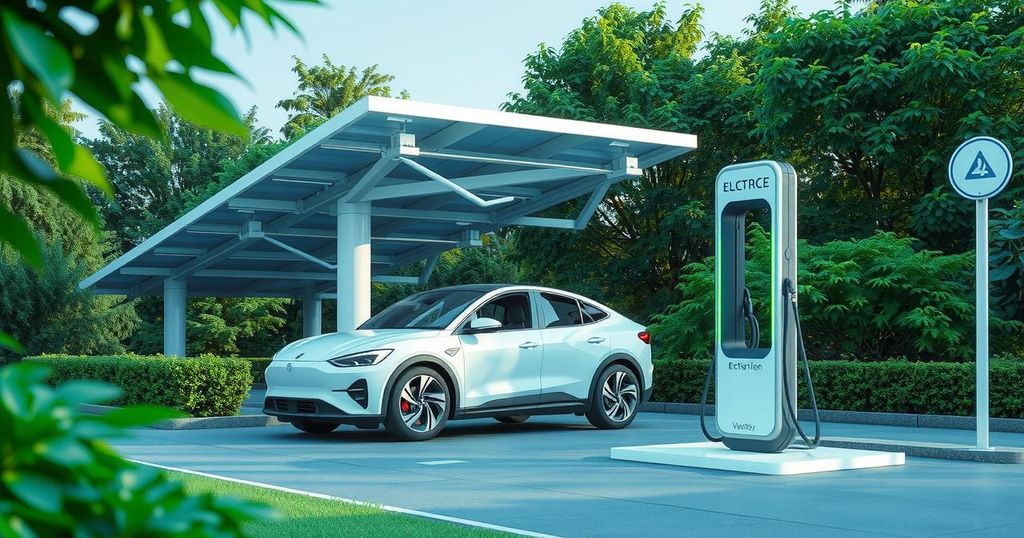Cars
ASIA, AUDI, AUDI FAW NEV CO, AUDI FAW NEV CO., LTD, AUTOMOTIVE INDUSTRY, BMW, CHANGCHUN, CHINA, EUROPE, EXPORT, FOREIGN INVESTMENT, GAO YUNING, GERMANY, HELMUT STETTNER, HUAWEI, INDUSTRY, INTERNATIONAL TRADE, MEGAFACTORY, MINISTRY OF COMMERCE, NORTH AMERICA, ROBOTICS, SCHOOL OF PUBLIC POLICY AND MANAGEMENT, SHANGHAI, TESLA, TSINGHUA UNIVERSITY, UNITED STATES
Marcus Chen
0 Comments
Foreign Automotive Brands Embrace Opportunities in China’s NEV Market
Foreign auto brands are capitalizing on growth opportunities in China’s NEV sector through investments and collaborations. Notable partnerships include BMW and Huawei, and Tesla’s establishment in Shanghai. The robust growth forecast and supportive policies solidify China’s position in the global market, encouraging foreign investment. Companies are customizing models to appeal to Chinese consumers, with Volkswagen leading initiatives tailored to local market demands.
Foreign auto brands are increasingly capitalizing on growth opportunities within China’s new energy vehicle (NEV) sector through enhanced investments, market expansion, and collaborative projects. Helmut Stettner, CEO of Audi FAW NEV Co., Ltd., noted that the transition from internal combustion engines to electric mobility is accelerating in China, particularly in the premium vehicle segment, presenting significant growth potential for Audi.
In March, BMW formed a partnership with Huawei to develop a digital ecosystem tailored for Chinese consumers. Additionally, Tesla’s Megafactory in Shanghai, its first outside the U.S., recently exported its initial batch of Megapack energy-storage batteries. Gao Yuning, Deputy Dean at Tsinghua University, indicated that China’s NEV market is characterized by a favorable business environment and efficient industrial supply chains, which are critical for attracting foreign investment.
With projections indicating that both production and sales of NEVs will surpass 12 million units in 2024, China is solidifying its dominant position in the global market. The country supplies 70 percent of the world’s battery materials and 60 percent of power batteries, underpinned by supportive government measures, including subsidies and improved infrastructure.
Data from the Ministry of Commerce reveals that over 60 percent of vehicles acquired through the 2024 replacement policy are NEVs, with foreign brands claiming more than 35 percent of these purchases. Chinese consumers’ openness to new technologies and an inclination towards smart networking are reshaping the market landscape, prompting foreign manufacturers to focus on vehicle attributes that address these new consumer preferences, such as intelligent configurations.
Volkswagen Group has committed to developing 11 new models for the Chinese market in collaboration with China’s First Automobile Works, set to launch beginning in 2026. Ralf Brandstaetter, Chairman and CEO of Volkswagen Group China, emphasized the importance of their partnership with FAW, stating that their strategy is directly aligned with meeting the evolving demands of Chinese consumers.
The robust growth of the Chinese economy and its ongoing commitment to openness are critical factors fostering confidence among foreign investors seeking to expand their operations in China.
In conclusion, foreign automotive brands are strategically positioning themselves to benefit from China’s burgeoning NEV market through investments, partnerships, and innovations tailored to local consumer preferences. The supportive policy environment, coupled with the rapid adoption of electric vehicles among consumers, is creating substantial opportunities for growth in the sector. As China continues to solidify its leadership in the global NEV landscape, foreign companies must adapt and innovate to thrive in this dynamic marketplace.
Original Source: www.shine.cn




Post Comment